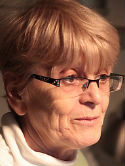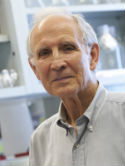A role for kit receptor signaling in Leydig cell steroidogenesis Journal Article
| Authors: | Rothschild, G.; Sottas, C. M.; Kissel, H.; Agosti, V.; Manova, K.; Hardy, M. P.; Besmer, P. |
| Article Title: | A role for kit receptor signaling in Leydig cell steroidogenesis |
| Abstract: | Kit and its ligand, Kitl, function in hematopoiesis, melanogenesis, and gametogenesis. In the testis, Kitl is expressed by Sertoli cells and Kit is expressed by spermatogonia and Leydig cells. Kit functions are mediated by receptor autophosphorylation and subsequent association with signaling molecules, including phosphoinositide (PI) 3-kinase. We previously characterized the reproductive consequences of blocking Kit-mediated PI 3-kinase activation in KitY719F/KitY719F knockin mutant male mice. Only gametogenesis was affected in these mice, and males are sterile because of a block in spermatogenesis during the spermatogonial stages. In the present study, we investigated effects of the KitY719F mutation on Leydig cell development and steroidogenic function. Although the seminiferous tubules in testes of mutant animals are depleted of germ cells, the testes contain normal numbers of Leydig cells and the Leydig cells in these animals appear to have undergone normal differentiation. Evaluation of steroidogenesis in mutant animals indicates that testosterone levels are not significantly reduced in the periphery but that LH levels are increased 5-fold, implying an impairment of steroidogenesis in the mutant animals. Therefore, a role for Kit signaling in steroidogenesis in Leydig cells was sought in vitro. Purified Leydig cells from C57BI6/J male mice were incubated with Kitl, and testosterone production was measured. Kitl-stimulated testosterone production was 2-fold higher than that in untreated controls. The Kitl-mediated testosterone biosynthesis in Leydig cells is PI 3-kinase dependent. In vitro, Leydig cells from mutant mice were steroidogenically more competent in response to LH than were normal Leydig cells. In contrast, Kitl-mediated testosterone production in these cells was comparable to that in normal cells. Because LH levels in mutant males are elevated and LH is known to stimulate testosterone biosynthesis, we proposed a model in which serum testosterone levels are controlled by elevated LH secretion. Leydig cells of mutant males, unable to respond effectively to Kitl stimulation, initially produce lower levels of testosterone, reducing testosterone negative feedback on the hypothalamic-pituitary axis. The consequent secretion of additional LH, under this hypothesis, causes a restoration of normal levels of serum testosterone. Kitl, acting via PI 3-kinase, is a paracrine regulator of Leydig cell steroidogenic function in vivo. |
| Keywords: | signal transduction; controlled study; protein expression; unclassified drug; nonhuman; animal cell; mouse; mouse mutant; animals; mice; animal tissue; cells, cultured; stem cell factor; proto-oncogene proteins c-kit; germ cell; animal experiment; animal model; mice, mutant strains; protein; cell differentiation; enzyme activation; autophosphorylation; phosphatidylinositol 3 kinase; mice, inbred c57bl; hypothalamus hypophysis system; leydig cell; animalia; mice, inbred strains; 1-phosphatidylinositol 3-kinase; paracrine signaling; testosterone blood level; mouse strain; negative feedback; point mutation; testosterone; testis; receptors, cell surface; male infertility; reproduction; kinases; spermatogenesis; sertoli cell; luteinizing hormone; gametogenesis; spermatogonium; steroidogenesis; luteinizing hormone blood level; seminiferous tubule; luteinizing hormone release; male; priority journal; article; leydig cells; kit receptor; kit y719f protein; testosterone synthesis |
| Journal Title: | Biology of Reproduction |
| Volume: | 69 |
| Issue: | 3 |
| ISSN: | 0006-3363 |
| Publisher: | Society for the Study of Reproduction |
| Date Published: | 2003-09-01 |
| Start Page: | 925 |
| End Page: | 932 |
| Language: | English |
| DOI: | 10.1095/biolreprod.102.014548 |
| PUBMED: | 12773427 |
| PROVIDER: | scopus |
| DOI/URL: | |
| Notes: | Export Date: 12 September 2014 -- Source: Scopus |
Altmetric
Citation Impact
BMJ Impact Analytics
MSK Authors
-
 7
7Kissel -
 9
9Agosti -
 161
161Manova-Todorova -
 115
115Besmer
Related MSK Work


